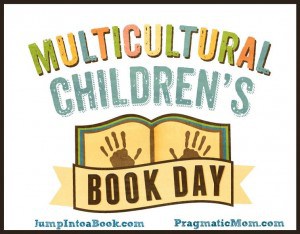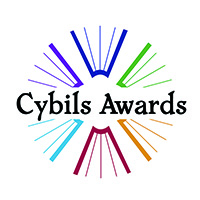It is (OK, yesterday was) the second annual Multicultural Children’s Book Day, hosted by Valarie of Jump into a Book and Mia of Pragmatic Mom! 
You can go over there to see lots and lots of posts on the topics, both wonderful book lists and thoughts about why diversity in publishing, especially for kids, is so very important.
I’m highlighting one of my very favorite series from 2014, a dystopian series that’s very happily good for older elementary and middle school kids, as well as teens. This answers two needs that I see – one, for genre fiction that’s just as diverse as the world today, and another, for exciting dystopian books for kids of 10 and up who really want to read them but maybe aren’t quite ready for full-on Hunger Games yet.
 Above World by Jenn Reese. Candlewick, 2012.
Above World by Jenn Reese. Candlewick, 2012.
I felt a little bit guilty reading this one, as it was the middle of the Cybils judging period, and only the last book of this trilogy was nominated this year. But I’d really been wanting to read this series, and didn’t want to spoil it by starting at the end – so in I jumped!
In the dark and distant future (cue the ominous music), the formerly habitable parts of Earth are no longer so welcoming. With the help of the LegendaryTech company, people undertook drastic measures to survive, genetically altering themselves to live in extreme environments.
Generations later, Aluna is a twelve-year-old Kampii who lives in an underwater colony. She’s clearly described both as having African features and coloring, and as closely resembling the founder of the colony (extra points for pioneering Black women scientists!) The ceremony where she will receive the Ocean Seed that will turn her legs into a tail is fast approaching, but for the first time, Aluna isn’t sure she wants a tail: the breathing necklaces that let the Kampii breathe underwater are failing and people are dying. The Elders won’t take action, feeling that tradition is most important. But Aluna is sure that the situation is more dangerous than the Elders will admit, and rushes off to investigate, followed by her best friend Hoku, a techie tinkerer from the poor side of the reef. As they explore, it’s fortunate that neither of them have their tails yet, as their journey takes them to shore. There Aluna helps a stranded Deepfell, a shark/human hybrid, the traditional enemies of the Kampii. They also gain entry to a legendary all-female Aviar fortress, where Hoku befriends the leader’s daughter, fellow techie Calli. The story builds as our heroes, now including a failed Centaur hybrid boy (failed as in all-human body) find out who is behind the failing technology and stage an initial confrontation…
Mirage by Jenn Reese. Candlewick, 2013.
Dash*, our centaur boy, breaks his exile to lead the group to the desert city Mirage, to warn the horse people of the dangers posed by the big bad, Karl Strand, and his clones. Unfortunately, a female clone, Scorch, is already there speaking in the ear of the High Khan. Their quest to gain allies for the fight already had slim chances – but now it looks like they might not even make it out of Mirage alive. Their only chance for survival – and it’s a slim one – is to go with Dash back to his desert clan, and have him face trial for breaking exile.
We meet more types of hybrids, and get to know a different kind in person – an Upgrader, what we would probably call a cyborg, who has technological rather than biological upgrades. You might have guess from my description of the first book that Aluna is a rebel, and she is in more ways than one. Kampii women aren’t supposed to be fighters, but Aluna practiced spear fighting with her one nice older brother, then learned some nifty new tricks from the Aviar in the first book. Now, she has two more martial arts styles to learn from, and it’s clear that the author is herself a practitioner of martial arts. With another big fight at the end, the book has enough excitement to avoid that common middle book slump.
*The third Dash of my Cybils reading this year – see also Dash in Shouldn’t You Be in School? and Dash in Space Case (another good choice for multicultural reading.)
Horizon by Jenn Reese. Candlewick, 2014.
I’ll keep this description brief to avoid spoilers. Time is running out to stop Karl Strand’s evil plot of world domination, but there still isn’t enough help, the few allies already gained are under massive attack, and there’s still the little problem of not knowing where the enemy headquarters are. When plans to infiltrate the enemy go wrong, Aluna and Hoku end up going back to the Kampii while Dash joins an Upgrader group. Calli must return to the Aviar fortress, which her mother is too ill to lead. But will the war – even won – stop the fragile efforts at unity?
There was so much to love about these books! I’ll start with the diversity, since that’s what we’re celebrating today: there’s lots of it. The whole series about facing prejudices with such a deep biological basis that it makes our prejudice about skin color seem like the silly thing it is. I have to admit, I’m not sure how comfortable I’d be talking with someone with the body of a shark or a snake. But the cast is diverse in skin color, too, with at least half of the main characters being people of color. We can tell right from the beginning that skin color isn’t related to the other genetic modifications – people of diverse backgrounds chose different modifications, so that Hoku and Aluna, both Kampii, have very different skin colors. There’s a lot of cultural diversity as well, and positive and negative aspects of the different cultures and their governments are highlighted throughout the stories. And just a hint of GLBT issues as well – all of the romances with the kids are hetero, but Cali’s mother is shown as being in a same-sex relationship.
Which brings me to romance: very nicely done, more as people getting to know each other than the insta-love based solely on appearance. They felt genuine, aching, while staying in territory appropriate for younger kids. Overall, while the series has many of the features of the popular teen dystopias, the tension is ratcheted up and the stakes feel appropriately high without the massive body counts that are so common. There’s also good character development for a lot of the major characters, not just Aluna. And it ends on a hopeful note, believing that we can recognize the humanity even in our enemies and work together for a better future. This series is highly, highly recommended.
And for older teens looking for diverse dystopian books, I also recommend Tankborn by Karen Sandler and Legend by Marie Lu.


Pingback: Multicultural Children’s Book Day | alibrarymama
Pingback: Sadiq series by Siman Nuurali for Multicultural Children’s Book Day 2020 | alibrarymama
Pingback: A Game of Fox and Squirrels by Jenn Reese. | alibrarymama
Pingback: Every Bird a Prince by Jenn Reese | alibrarymama
Pingback: Cruzita and the Mariacheros by Ashley Granillo for MCBD 2024 | alibrarymama